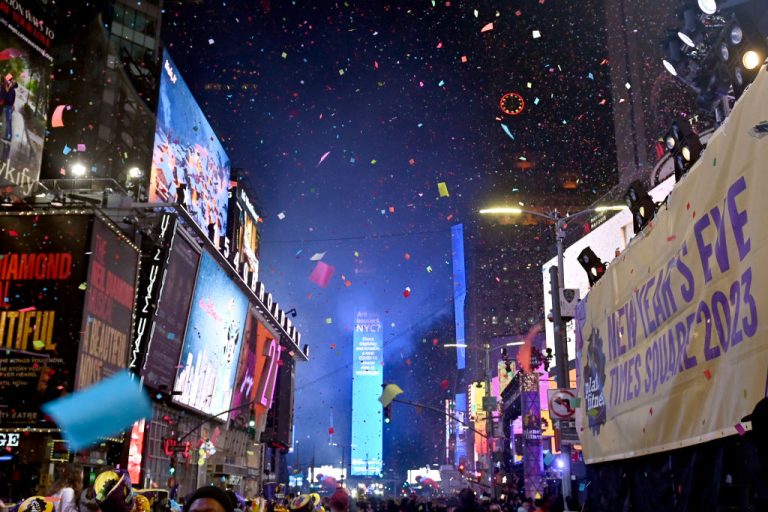During this year’s New Year’s Eve celebrations in Times Square, Huang Ping, consul general of China’s Consulate in New York, was heard saying during a televised segment that the Chinese Communist Party (CCP) is a “great party,” and urging tourists to visit Hong Kong.
Known as a staunch supporter of the CCP, Huang has been serving as the city’s consul general since 2018, and made the remarks during the event’s “Hong Kong Rocks!” celebration.
MORE ON THE CCP’S GROWING INFLUENCE IN WESTERN MEDIA:
- How China Uses COSCO Ships to Boost Its Political Influence Abroad
- Solomon Islands Confirms Security Draft with China, Alarming Neighbors in Pacific Region: Leaked Files
- UN Whistleblower Fired For Sounding Alarm on Controversy Surrounding Chinese Dissidents
- Virginia Roundtable Discusses CCP Infiltration in US Business, Social Media, and Entertainment
The event, which takes place every year, is held to celebrate and showcase the vibrant culture and spirit of Hong Kong in hopes of encouraging U.S. tourists to visit the city.
Featuring a variety of entertainment — including traditional and modern music, dance performances, martial arts demonstrations, as well as food and shopping stalls — the event is known to attract thousands of tourists from all over the world.
Global reach
However, Huang’s remarks have brought renewed concern about the CCP’s infiltration of U.S. businesses, entertainment, and politics. He also previously denied the existence of the CCP’s abuse against the Uyghur Muslim community and has waived off comments regarding China’s human rights record.
Success
You are now signed up for our newsletter
Success
Check your email to complete sign up
As China’s economy nosedives from heavy-handed “zero-COVID” measures that shuttered businesses, halted supply chains, and led to skyrocketing unemployment, the world’s second largest economy finds itself struggling to jumpstart its economy and end virus restrictions.
China has also seen an uprising in mass protests following demonstrations that saw hundreds of thousands of people take to the streets to demand an end to the virus controls. Since phasing out its pandemic curbs in early December, China has reported its largest influx of new infections since the pandemic first began in early 2020.
In recent years, the CCP has steadily increased its influence in the West — particularly in manipulating the way it is portrayed in the media. This has raised concerns about the CCP’s ability to shape global public opinion and influence political decisions in democratic countries.
One of the ways it has sought to extend its influence is through its media outlets, such as China Central Television (CCTV) and China Radio International (CRI). These outlets have been expanding their reach globally — particularly in the U.S., Europe, and Asia Pacific — and have been accused of disseminating propaganda, censoring critical voices, and suppressing freedom of speech.
The CCP has also been using its economic power to influence organizations and individuals in the West by providing funding to media outlets and academic institutions — and via the acquisition of media companies by Chinese state-backed entities.
Activists have also pointed out that the CCP’s use of so-called “troll armies” on social media to spread its message and influence public opinion can be used to spread disinformation, harass critics, and censor free speech on social media platforms.
Erosion of civil rights
In recent years, Hong Kong has witnessed a significant attack on its civil rights after being returned to Communist rule in 1997.
The attacks, which have included censorship, mass arrests of activists and human rights attorneys, and the enactment of the National Security Law (NSL) have raised concerns about the future of the city’s autonomy and freedoms, as well as the potential impact on its status as a global financial hub.
The NSL — which went into effect on June 30, 2020 — at the behest of the mainland Chinese government, bans many forms of political dissent and expression deemed dangerous as threats to “national security,” and allows for a maximum sentence of life imprisonment.
MORE ON HONG KONG’S HANDOVER:
- Jailed Hong Kong Democracy Activist: Opposing the Communist Party Is Not ‘Anti-China’
- Media Tycoon Jimmy Lai to Plead Not Guilty Under Hong Kong National Security Law Despite Threat of Life Imprisonment
- Joseph Zen, One of Asia’s Most Senior Catholics, Arrested in Hong Kong on National Security Charges
- Hong Kong Activist, Chow Hang-tung, Sentenced to 15 Months in Prison
Many have pointed out that the attacks are in direct contradiction of the 1984 Sino-British Joint Declaration — whereby China promised to guarantee Hong Kong’s civil liberties for at least 50 years after the U.K. returned the city back to Chinese sovereignty.
Other concerns include the increasing interference of the CCP in Hong Kong’s political and legal systems — including the disqualification of elected officials, and the introduction of laws that restrict freedom of speech and assembly.
There have also been concerns about the erosion of judicial independence in Hong Kong — with fears that the CCP is seeking to exert greater control over the city’s legal system. This has included the arrests of judges and the removal of judicial independence from key legal bodies throughout the city.
In addition, reports of human rights abuses in Hong Kong, including the use of excessive force by police and the detention of individuals without due process have come to light in recent years — leading to widespread protests and condemnation from the international community.
















